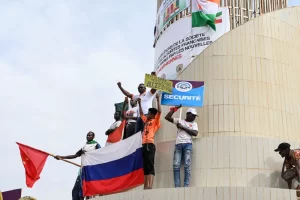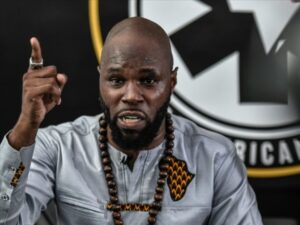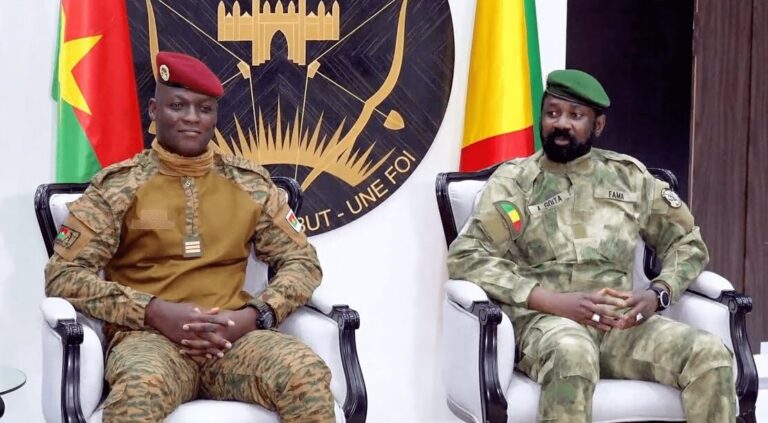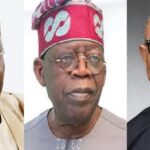The trending successful military coups in West Africa today indicate the continuation of political processes and leadership by another method. Their executions have been systematic; citizens protest against the ruling elites’ failure to ensure economic, political, social and security provisions, then the military moves in.
West Africa is regarded as one of the most unstable subregions on the African continent. Between 1991 and 2011, some of the most brutal civil conflicts in the continent’s history wrecked West Africa. Another contributor to instability in West Africa has been the continuing role of the military and the phenomenon of military regimes. Of the fifteen ECOWAS states, only Senegal has not witnessed a military coup.
The first military coup in Africa was staged on the night of January 13, 1963, when Togo’s President Sylvanus Olympio was shot dead by rebels. The scourge of military coups has further infected other parts of Africa. Moreover, military coups are contagious. A successful coup significantly increases the probability of military coups in that country or its neighbors.
The reactions, actions, and inactions of African public intellectuals, activists, academics, and other opinion leaders to these coup developments have not given enough ground for consensus on whether military coups are the needed form of governance in Africa. However, the agreed-upon common position is that democratic gains in Africa are slowly diminishing.
In April 2019, the government of Sudan’s Omar al-Bashir was deposed in a military coup that was backed by some of its civilian allies. The civilian-military alliance overthrew the interim structures and effectively ended al-Bashir’s rule, and General Abdel Fattah al-Burhan became the head of the transition that incorporated civilians.
Since then, statistics have been going southward. Since August 2020, Africa has experienced eight military coups. These have been in Mali, which witnessed two coups in nine months; Guinea in September 2021; Sudan in October 2021; Burkina Faso had two coups in eight months—in January and September 2022; Niger in July 2023; and Gabon in August.
Such political developments have brought historic turning points. State weakness has played a key role in these incidences. In other jurisdictions, they have occurred in part due to the government’s failure to prevent the development of Al-Qaeda and Islamic State-affiliated groups throughout the Sahel.
Besides the coups being ‘people-driven’, what is striking is that the most complicating scenario that restricts efforts by African countries or the West to reverse these takeovers is that it is young men who rally in support of military coups and their leaders. With such support, coup makers have resisted regional and continental norms against unconstitutional changes in government and, in Niger, have shunned engagements.
The cases of military coups in Mali, Guinea, Burkina Faso, and Guinea provide key insights on the changing nature of relations between citizens and military men.
Are Africa’s elections an exhausted idea?
Africa is going through “democratic fatigue and coloniality rupture” that is requiring an alternative to the Western liberal lens of looking at issues, says Dr. Alexander Rusero, a scholar on decolonial thought leader and lecturer at the Africa University in Zimbabwe.
Dr. Rusero argues that events in West Africa’s coup belt are indicative of the need to recognise the role of military men in Africa, as democracy through elections is now an exhausted idea.
“Democracy expressed through elections is now an exhausted idea, as there are certain alternative modes of installing governments, and the military heading that government is just but one of those modes. What we are witnessing is also what we can call the coloniality rupture. There is a rupture of the colonial grip by France over erstwhile colonies. So there are certain circumstances where the military becomes the last resort because there are certain powerful men who preside over states but fail to deliver public goods.
“There is therefore a recession to the extended influence of France in these establishments to the extent that all military men are calling the French government off whenever they assume military power to say, France, you no longer have any business in the affairs of our country; please leave. This talks to the coloniality rupture. Coloniality which has been sustained over the years is slowly depleting and depreciating,” argues Dr. Rusero.
The ECOWAS bloc and the African Union (AU) have been at the forefront of condemning military and unconstitutional power changes in the coup belt but have been silent when elected officials use the military to suppress dissent, civic society organizations, and political opponents using the armed forces.
Dr. Rusero further emphasized that “power consolidation in Africa is through the military, which remains the extension of a political appendage of power. As long as the military is the appendage of political power, the military man also wants to be in that seat because they know the dividends that come with that seat.
“It is hypocritical for the African Union to insist that it does not recognize these unconstitutionally placed governments, yet they hardly say anything whenever there are certain internal dynamics that result in repression, precisely by the incumbent using military force. So as long as the peer review mechanism does not call states to order whenever democracy is in recession, there will be no cure to the coups in Africa.”
Second social contract, covenant
The academic contributions by Western political philosophers like Thomas Hobbes, John Locke, and Jean-Jacques Rousseau see a social contract as the legitimate consent that those elected officials leading government policy require from those they govern.
However, a contradiction now exists where non-elected officials are given the mandate and consent to govern by the people. There is evidence of an urgent need to renegotiate and redefine models of a social contract throughout a continent where vast sections of the population feel estranged from real citizenship when led by elected officials.

To endear themselves with the people, the coup leaders in Mali (Col. Assimi Goïta), Guinea (Col. Mamady Doumbouya), Burkina Faso (Capt. Ibrahim Traoré), and Niger (Gen. Abdourahamane Tchiani) promised to institute enough fundamental change to lay new social, economic, and political foundations for their societies. In other words, the military leaders are seen as promising social justice.
Thus, there has emerged an implicit agreement, a new social contract, between the people and their military men and armed forces. Under the new social contract, the citizens and the armed forces have committed to recalibrate the foundations of the state, fight corruption, and expunge French influence and neo-colonialism in Africa’s Sahel region.
Pan-Africanism, neo-colonialism, Russian flags
A new Pan-African spirit is being reincarnated in young African opinion leaders and modern activists who share the values of the first generation of the continent’s liberators. 42-year-old French-Beninese Pan-African ideologue and anti-Western activist Kémi Séba has been the leading voice of reason to endorse the military leadership in Niger, at a time when it has not been fashionable to do so.

In September, he addressed thousands of pro-coup supporters in Niamey, Niger, rallying people to support the military leadership borne out of the July coup.
“We support General (Abdourahamane) Tchiani (as the head of the regime), we support the military who have taken their responsibilities,” he said after meeting General Tchiani. He observed that the military had listened to the people and “decided to stop the mechanism of neo-colonialism,” hammering that France and the West will not stop the ongoing revolutionary process.
“The Nigerien authorities are counting on us to continue this work of deconstruction of Françafrique and the propagation of Pan-Africanism. We will not disappoint them,” claimed Seba.
On his official X handle (formerly Twitter), he reiterated: “No Pan-Africanist can count on the flawed laws of the institutions of Françafrique to destroy the latter. Only a radical rupture, characterized by the mobilization of the people, allied to the army, and to a powerful geopolitical partner opposed to Western imperialism, will be able to do so.”
He urged positive alliances with geopolitical partners and advised Nigeriens against waving Russian flags.
“Every African leader who collaborates with French neocolonialism is politically on borrowed time. We have started work in the Sahel, and we are going to finish it. Military bases, CFA Franc, cooperation agreements, incestuous relationship between corrupt African and French elites—we are your terminal; know this well,” warned Seba.
From Seba’s advocacy, it is desirable to see Africans free from neo-colonialism, but it is also important to realize that the end of neo-colonialism is likely impossible as West African governments and their economies are not only stimulated by foreign aid but also require it for their own survivability. Unity in breaking this bondage is what Africans require.
Western thought, wrong prescriptions
Experiences in the coup belt resemble the demystification of the Western liberal lens that the military man must not be anywhere close to the political menu. This is fast becoming a myth, as the military man is in essence at the center of the scheme of things in as much as the political dynamics and the political balance of forces in a country are concerned.
The success of military coups in Africa indicates one variation. It is now clear that elections alone are not able to deliver an equitable system of governance. Elections, modeled on the Western liberal system, have alone been unable to correct and address post-colonial challenges in Africa.
Without partaking in any democratic contestation, coup leaders in Guinea, Burkina Faso, Mali, and Niger made military interventions responding to the deteriorating security situations and poor economic and social governance of their elected officials. Also, citizens need to be politically conscious, as political leaders create false expectations in their bid to win power. They know they cannot deliver on election promises. Part of this explains their rejection and the embrace of the military.
Decolonizing democracy and development
Prof. Last Moyo, a scholar at the British University in China, doubts the sincerity of the coup plotters and urges citizens to be cautious when they try to embrace them. He describes the military leaders as “opportunistic elements being used to depose governments” and desires that Africa develop its own version of democracy that is not supported by the structures of neocolonialism as they are today.
“The problem is that Africa’s politics is in service to the modern commercial empire that is non-territorial but is still there; that is neocolonialism. Africa’s institutions are not delivering. That is why it is easy for Western countries to interfere in Africa because our politics are not serving the people’s interests. There is a need to reconstitute politics in Africa and answer the fundamental question of who our politics should serve.
“The tragedy that Africa has is that these coups are not necessarily the panacea to African problems. Once they (coup leaders) are given the mandate, unfortunately, they begin to degenerate into the corruption they were condemning. So these cases in West Africa need some time to be understood,” submitted Prof. Moyo.
As the military coups are also partly showing, neoliberal models of democracy and development being implemented in Africa only pander to the interests of Western corporations and global capital. They are not people-driven and oriented in their implementation.
















